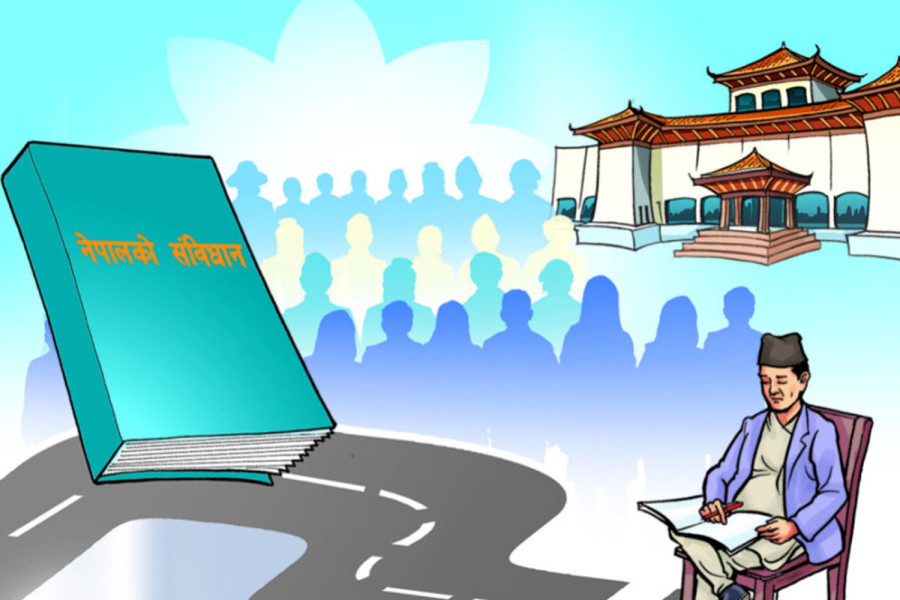Politics
No clear path, commitment from UML and Congress to amend constitution
In upper house, they’ll need backing of every party except Maoists to secure 2/3 majority.
Purushottam Poudel
The two major parties, the Nepali Congress and the CPN-UML, reached a written agreement on Monday to form a new government. Although the leaders of both the parties said they have agreed to amend the constitution, the agreement document is reportedly silent on it.
“Leaders of two parties have agreed in principle to amend the constitution, but the amendment has not been included in the power-sharing agreement,” a Congress leader who is closely associated with the latest political developments told the Post on the condition of anonymity. “We are still discussing how to make changes to the constitution.”
Congress President Sher Bahadur Deuba informed his party leaders during a meeting on Tuesday morning that they have decided to amend the constitution, as per the party insider.
The midnight deal between the Congress and the UML on Monday, however, has decided that UML chair KP Sharma Oli will lead the government for the first half of the remaining term of Parliament.
“On Monday, the two parties essentially agreed on three major points,” a UML leader closely involved in the political developments told the Post. “To form a stable government, to address the country’s economic crisis, and new government leadership.”
The UML leader also confirmed that there is no written agreement on amending the constitution. However, he claimed that the constitution amendment will happen in due course after the formation of the Congress-UML government.
UML General Secretary Shankar Pokharel also claimed that the new Congress-UML government plans to amend the constitution to ensure political stability. After the agreement on power-sharing between Congress and UML on Monday night, the general secretary wrote on social media that a ‘national consensus government’ would be formed under Oli’s leadership.
“There is an agreement to form a government of national consensus under Oli's leadership to amend the constitution for political stability and draft laws accordingly,” Pokharel wrote.
Although they are yet to disclose the proposed amendments, both Congress and UML leaders have been questioning the relevance of the current electoral system.
So long as the electoral system (a mix of direct and proportional elections) remains, no single party will secure a majority, therefore, the two parties have decided to change the electoral system, according to leaders of the two parties the Post spoke with.
In the UML, there is a strong opinion that for a party to be a national party, the minimum vote threshold should increase from 3 percent to 5 percent of the total valid votes cast under the proportional category, says a UML leader.
When it comes to the electoral system, the Congress leaders are not happy with the proportional electoral system.
Since the first constituent assembly election in 2008, Nepal has been practising a mixed electoral system in which 60 percent of representatives are elected through direct election, whereas 40 percent are elected through proportional representation.
“If we start amending the constitution, the process might not stop at changing the electoral system,” says former Chief Election Commissioner Nilkantha Uprety. He terms the proportional system as a big political achievement and says it should be continued.
“We introduced this system to ensure proportional representation of all groups and communities in the country,” Uprety told the Post. “The system is still very relevant in the Nepali context.”
Just changing the electoral system does not ensure political stability, Uprety said.
“I hope our political parties give serious thought to the things that the country needs to change and the things it needs to keep constant,” he added. “We should avoid going back to a pre-2008 state when there was no proportional representation.”
While the two party leaders are planning to amend the constitution to give the country a semblance of stability, a two-thirds majority in both the lower and upper house is needed to amend the charter. This means 184 seats in the 275-strong federal parliament.
Not just that. In any matter related to any of the seven provinces, the provincial legislatures must also approve the amendments, again with two-thirds majority.
Though the Congress and the UML, largest parties in Parliament with 88 and 78 seats, have joined hands to form the government, they will still need the support of 18 more lawmakers to achieve a two-thirds majority in the lower house.
And in the 59-member upper house, the two parties will need the backing of every party except the CPN (Maoist Centre) to secure a two-thirds (40 votes) majority, to amend the constitution.
“The constitution amendment will not happen in haste. It is a long process that the Congress-UML government will accomplish in time,” says Gyanendra Bahadur Karki, Congress leader.
“If the two largest parties decide to amend the constitution, I believe we will be able to muster the numbers in both the Houses,” Karki told the Post.
Meanwhile, the Maoist Centre has seen the agreement between the Congress and UML to amend the constitution with suspicion. A Maoist Centre meeting held at Baluwatar on Tuesday morning interpreted the amendment proposal as the two largest parties questioning the current political system in the name of seeking political stability.
“Where will the constitutional amendment lead us?” the secretary of Maoist Centre, Devendra Paudel, asked. “If the constitutional amendment was that necessary, it could also have been done close to the next election cycle.”




 8.79°C Kathmandu
8.79°C Kathmandu














